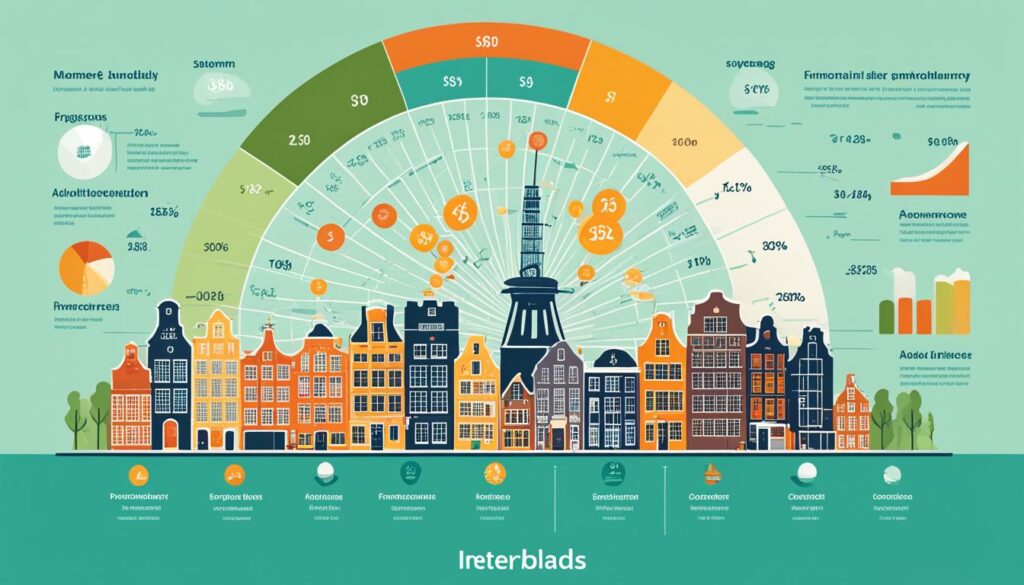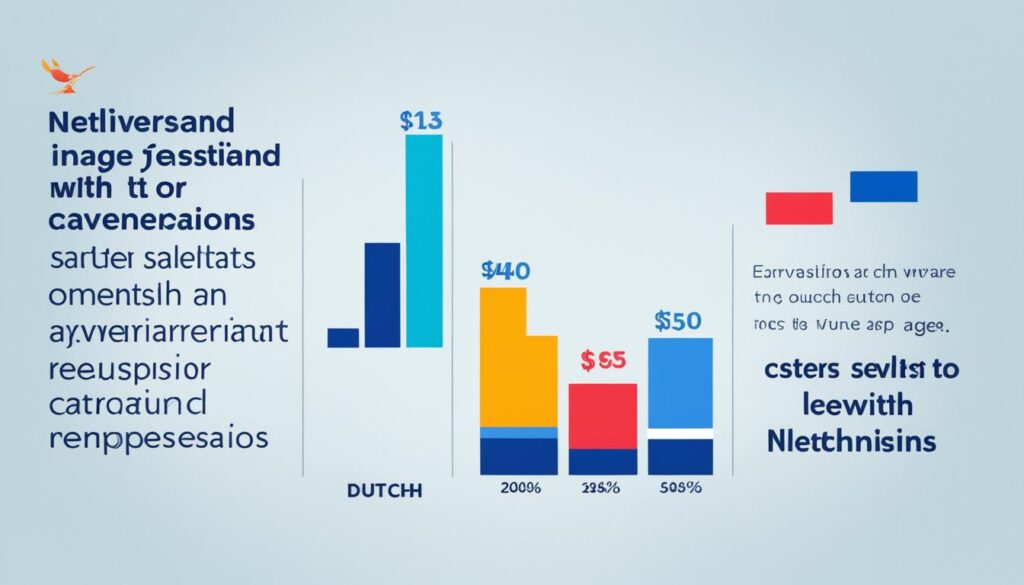The Netherlands boasts a strong economy and an impressive quality of life, making the average salary a critical component for those contemplating career choices. In 2023, the average salary in the Netherlands stands at €2,855 per month before taxes, as reported by the Dutch Central Planning Bureau1. Understanding these figures not only provides deeper insights into the financial landscape of the country but also aids individuals in aligning their career expectations with realistic earning potentials. These Dutch wage statistics reveal that salaries can vary widely based on various factors, including occupation, education level, and geographical location explore more about salary insights. By examining these elements, professionals can make informed career decisions that reflect both their aspirations and their financial realities.
Key Takeaways
- The average monthly salary in the Netherlands for 2023 is €2,855 before taxes.
- Understanding the Netherlands average income helps align career decisions with financial expectations.
- Various factors affect salaries, including occupation, education, experience, and location.
- Statistics reveal a broad spectrum of income brackets among the working population.
- Average wages reflect both opportunities and disparities in the job market.
Contact us if you are Interested in Buying Property Abroad!
Understanding the Average Salary in Netherlands
In 2024, the average salary in the Netherlands is anticipated to reach €44,000 annually, translating to around €3,666 each month, according to recent projections from the Dutch Central Planning Bureau2. This increase from previous years reflects positive salary trends in the Netherlands, even as various economic factors may influence individual earnings. In 2023, the reported net monthly salary stood at €3,086, with a predicted increment of about €79.17 for 2024, driven by tax advantages3.
Current Average Salary Figures
The Current Average Salary for workers in the Netherlands will witness diverse figures depending on sectors and geographical locations. For instance, individuals in Amsterdam earn an average salary of €54,000 annually, while those in cities like Groningen see lower averages at €43,0002. Various professions demonstrate differing salary ranges; for example, a software engineer could earn between €3,444 to €8,731 monthly, showcasing the disparity across industries2. Furthermore, educational backgrounds significantly affect these values, with university graduates typically earning between €30,456 and €41,472 per year2.
Comparison with Previous Years
An analysis of historical salary data reveals a steady growth trend over the past few years. The anticipated average salary for 2024 reflects a positive change compared to the previous figures, indicating that individuals can expect a net income rise averaging 5.6%3. The rising minimum wage, currently at €2,371.20 monthly, signifies progress in labor compensation2. This progression, coupled with anticipated increases in sectors such as catering and construction, marks the Netherlands as an evolving market in terms of overall Netherlands Average Income opportunities.
Netherlands Average Income: Key Statistics

The Netherlands Average Income plays a crucial role in understanding the country’s economic landscape. The current trends in Dutch wage statistics reveal insights into the monthly and yearly salary breakdown. For example, the median gross income for a working individual in the Netherlands in 2024 is approximately 44,000 euros annually, which translates to around 3,666 euros gross monthly4. Comparatively, the income of individuals with paid employment in 2021 was just under 47,000 euros yearly1.
Monthly and Yearly Salary Breakdown
Examining the detailed salary breakdown provides clarity on income expectations in the Netherlands. The average monthly salary can vary significantly across different age groups. For instance, individuals aged 15-25 earn about 37,500 euros per year, while those aged 25-45 receive around 37,900 euros4. On the higher end, the average gross salary for individuals aged 45-65 reaches closer to 42,700 euros4. Furthermore, the minimum hourly wage for adults aged 21 and over is set at 13.27 euros, establishing a foundational income level in the workforce4.
Impact of Inflation on Average Income
Inflation effects can significantly reshape the perception of the Netherlands Average Income. While nominal average wages may seem stable, real wages often struggle to keep pace with rising living costs. This discrepancy is important as it can directly impact disposable income and individual spending power4. Understanding these inflation effects is crucial for budgeting and planning financial objectives.
Factors Affecting Dutch Wage Statistics

In understanding the complex landscape of salaries in the Netherlands, various factors significantly contribute to variations in earnings across different segments. These factors include occupation and industry variations, the impact of education and skill level, and geographical influences on salaries.
Contact us if you are Interested in Buying Property Abroad!
Occupation and Industry Variations
Occupation Wage Variations reflect the influence of specific industries on salary structures in the Netherlands. Certain sectors tend to pay considerably higher wages compared to others. For instance, managerial positions within finance can see salaries reaching €73,745 annually, while sectors like healthcare and engineering offer around €46,000 and €43,945, respectively5. Job seekers must assess these industry trends closely when considering their remuneration potential, as average annual salaries in top cities such as Amsterdam and Eindhoven are notably higher at €53,000 and €52,0006.
Education and Skill Level Effects
The Wage Impact of Education is pivotal in determining salary levels. Individuals with advanced degrees command significantly higher wages. For instance, those holding a university degree or higher can earn approximately €46,665, whereas non-graduates earn around €28,5356. This connection highlights the importance of education as a pathway to increased earning potential and underscores how Skill Level and Salary are interrelated.
Geographical Influence on Salaries
Geographical Salary Variations provide insights into how location affects earnings. Major urban centers like Amsterdam and Eindhoven offer higher salaries than rural areas, reflecting the greater cost of living and job availability5. For example, the median monthly salary in Amsterdam is about €4,672, illustrating a stark contrast to typically lower wages in smaller towns5. Such Regional Salary Differences affect not only current earnings but also career advancement opportunities in these locales.
Holland Salary Range Overview
The salary landscape in the Netherlands showcases a wide disparity between the lowest and highest wages. For example, entry-level positions commonly earn around €1,500 per month, while highly skilled professionals can exceed €6,000 monthly7. The national minimum wage set for adults, which is €2,308.98 monthly for a standard 40-hour work week, underscores this range and positions the Netherlands as one of the top countries in Europe for minimum salary8.
Lowest and Highest Wage Analysis
While discussing the Lowest Wage Netherlands, young workers face varied minimum wages that decrease with age, establishing a clear income ladder8. At the higher end, sectors such as banking, law, and energy report salaries ranging from €61,288 to €66,977 annually, revealing the robust financial opportunities available in these fields8. Furthermore, the median gross annual salary in the Netherlands was noted to be €44,000 in 2024, with a monthly counterpart of approximately €3,6674.
Sector-Based Salary Ranges
Different sectors showcase substantial variations in salary ranges. Technology professionals, for instance, may see earnings between €3,000 to €7,000 monthly, reflecting the high demand and competition for such roles7. In contrast, creative industry professionals often earn less, leading to a fragmented salary landscape influenced by industry-specific demands7. For more in-depth insights on interpreting these wage figures and comparative salary scales, resources are available in articles like Salary and Payslip Insights and Amsterdam Salary Comparisons.
Contact us if you are Interested in Buying Property Abroad!
FAQ
What is the average salary in the Netherlands?
How does the average salary compare to previous years?
What factors influence average income in the Netherlands?
How does inflation impact salary figures?
What is the salary range in the Netherlands?
Which industries in the Netherlands offer higher salaries?
How does education affect salary potential in the Netherlands?
Are there geographic differences in salary across the Netherlands?
Source Links
- https://longreads.cbs.nl/the-netherlands-in-numbers-2023/what-is-working-peoples-income/
- https://housinganywhere.com/Netherlands/average-salary-netherlands
- https://dutchreview.com/expat/wages-netherlands-dutch-salaries/
- https://www.iamexpat.nl/career/working-in-the-netherlands/salary-payslip-dutch-minimum-wage
- https://robin.jobs/work-in-the-netherlands/average-salary-in-the-netherlands
- https://dutchreview.com/expat/average-salary-netherlands/
- https://www.amsterdamtips.com/salaries-in-amsterdam-netherlands
- https://www.expatica.com/nl/working/employment-law/minimum-wage-in-the-netherlands-852578/

Comments